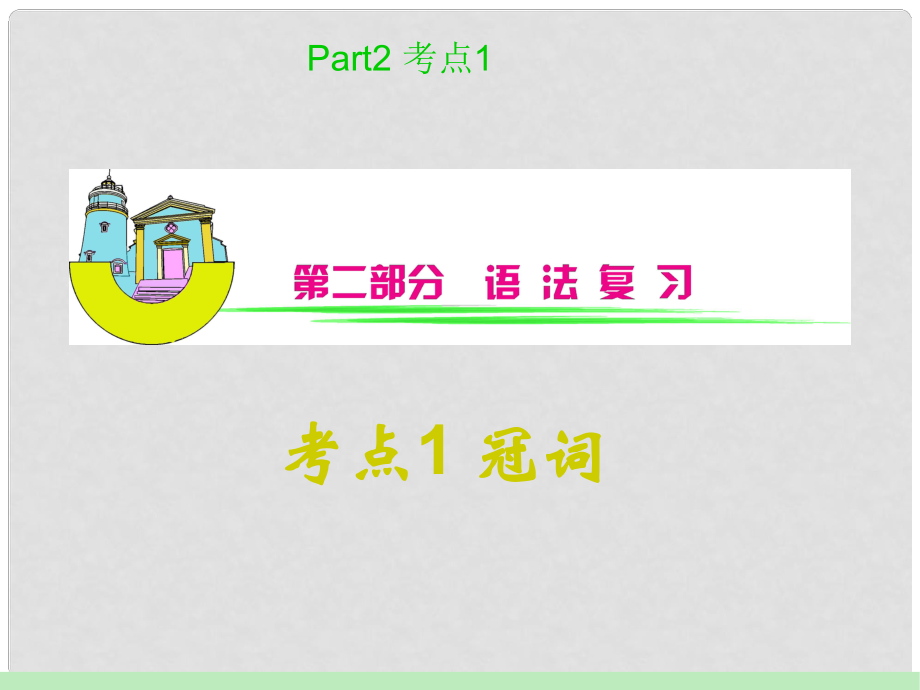《安徽省高中英語總復(fù)習(xí) 考點(diǎn)1 冠詞課件 北師大版 新課標(biāo)》由會(huì)員分享����,可在線閱讀,更多相關(guān)《安徽省高中英語總復(fù)習(xí) 考點(diǎn)1 冠詞課件 北師大版 新課標(biāo)(15頁珍藏版)》請(qǐng)?jiān)谘b配圖網(wǎng)上搜索���。
1�����、Part2 考點(diǎn)1考點(diǎn)考點(diǎn)1 冠詞冠詞1.主要考查的知識(shí)點(diǎn):定冠詞的基本用法���、抽象名詞具體化和固定搭配等。2.復(fù)習(xí)重點(diǎn):(1)定冠詞的用法(基本用法必須熟記��。下面幾句順口溜可以幫助記憶:特指雙熟悉�,上文已提及;世上獨(dú)無二��,序數(shù)最高級(jí)���;普轉(zhuǎn)專有名��,習(xí)語及樂器����。)(2)不定冠詞的基本用法��。 (3)幾種特殊用法:專有名詞前用不定冠詞����,表示“像的一個(gè)人或物”。如:a Napoleon��。姓名前用不定冠詞�����,表示“某個(gè)叫的人”,多指不認(rèn)識(shí)的人�����。如:a Miss Smith�。用于某些物質(zhì)名詞前,表示“一種����、一份、一陣”等��。如:a tea and a coffee����。用于某些抽象名詞前,使抽象概念具體化��。 這種用
2��、法的名詞有 a surprise/knowledge/success/failure/ pleasure/interest/joy 等等�����。1. 不定冠詞(a/an)(1) I only know it was a dog not a cat that bit me.(2) They have a second house in the country.(3) They are all songs of a type.(4) A Mr. Li died on a Saturday.(5) He walks twentymiles an hour.(6) What a lovely surpris
3��、e to see you again!(7) When can we enjoy a new moon?(8) Its a most boring book.規(guī)則1:當(dāng)緊挨著不定冠詞的單詞的第一個(gè)音素為輔音音素時(shí),用 a���;而當(dāng)緊挨著不定冠詞的單詞的第一個(gè)音素為元音音素時(shí),用an��。特別提醒:判斷a還是an的依據(jù)是其后的詞的發(fā)音���,而不是字母��。例如:a university student, a unique style, a European writer, an honest boy, an xray, an 800metrelong bridge等���。規(guī)則2:“a/an 可數(shù)名詞單數(shù)”常用來表示
4、泛指����,如:(1)。規(guī)則3:序數(shù)詞前面加不定冠詞a/an表示“再一�����,又一”之意���,如:(2)���。規(guī)則4:在“of a/an 名詞單數(shù)”結(jié)構(gòu)中�,不定冠詞a/an表示“同一�����,相同”����,如:(3)。規(guī)則5:不定冠詞a/an用在姓氏和星期名稱前表示“某一個(gè)”��,“有一個(gè)”��。也可指與某名人有類似性質(zhì)的人或事物�,相當(dāng)于“a certain”,如:(4)�����。規(guī)則6:a/an 在表示時(shí)間和度量單位的名詞前�����,表示“每一”�,如:(5)����。規(guī)則7:不定冠詞a/an用在某些抽象名詞和物質(zhì)名詞前�����,表示“一種����,一件����,一個(gè)”之意;如果這些名詞前有形容詞修飾�����,則不定冠詞通常不可少���,如:(6)��。規(guī)則8:moon, sky, world等表示
5�、世界上獨(dú)一無二的事物被形容詞修飾時(shí)前面要加不定冠詞��,如:(7)。規(guī)則9:不定冠詞a/an用于most 前表示程度���,意為:“非常���,十分”,如:(8)����。2定冠詞(the) (1) He lives in the north.(2) The Smiths live in the apartment above ours.(3) He pays the rent by the month.(4) She is good at playing the piano.(5) This morning I saw a woman who looked like your aunt.(6) Do you kno
6、w who invented the telephone?(7) We caught him by the arm.(8) He looked up at the stars in the sky.(9) The Yellow River flows into the Bohai Sea.規(guī)則1:方位名詞east, west, south, north, left, right, front, middle和時(shí)間名詞present, past, future前都要用定冠詞the��,如:(1)���。特別提醒:特別提醒:這些方位名詞作副詞用時(shí)不加冠詞He was then heading east fo
7�����、r the school farm.他當(dāng)時(shí)正朝東向?qū)W校農(nóng)場走去�。規(guī)則2:定冠詞用于姓氏名稱的復(fù)數(shù)前��,表示“一家人或夫婦倆”��。如:(2)。規(guī)則3:by 和計(jì)量單位名詞連用時(shí)��,名詞前要用冠詞the���;例如:by the yard/the meter/the dozen/the month/the year/the hour�����,如:(3)�����。但如果該名詞為不可數(shù)名詞時(shí),則不用冠詞�。如:by weight/volume/area。規(guī)則4:當(dāng)西洋樂器名稱作play的賓語時(shí)����,名詞前必須加定冠詞the,如:(4)�����。規(guī)則5:名詞由短語或定語從句修飾而成為特指時(shí)要加定冠詞the���;但是���,修飾以后仍然是泛指時(shí)就不能用定冠
8�、詞�。如:(5)。規(guī)則6:“the 可數(shù)名詞單數(shù)”表示泛指時(shí)通常是在談?wù)摪l(fā)明物和科技問題����,如:(6)。規(guī)則7:用于某些介詞短語中指身體的某個(gè)部分(介詞the身體部位)�,如:(7)。規(guī)則8:另外獨(dú)一無二的名詞���、江河湖海(山脈��、群島��、海灣��、海峽)等地理名詞�、形容詞和副詞最高級(jí)及某些含有普通名詞的專有名詞(國名����、組織機(jī)構(gòu)、建筑物、報(bào)紙雜志�����、會(huì)議條約等)前要用定冠詞����,如:(8)、(9)���。3零冠詞 (即不用冠詞)用適當(dāng)?shù)墓谠~填空(1) _/_ wealth does not always bring _/_ happiness.(2) He left _/_ school at the age of 18
9�����、. 他18歲畢業(yè)���。(3)They live near _a_ school. 他們靠近一所學(xué)校居住�����。(4) Todays vehicles use two kinds of _/_ fuel petrol and diesel.(5) He used to be _a_ teacher till he turned _/_ writer.(6) _/_ president was holding _the_ meeting.規(guī)則1:物質(zhì)名詞和抽象名詞都是不可數(shù)名詞�,泛指總稱時(shí)不用冠詞,如:(1)中wealth和happiness�����。規(guī)則2:class, school, church, colle
10、ge, university, hospital, prison, court, bed, table等名詞�����,當(dāng)我們?nèi)∷鼈兊墓δ芤饬x作某一目的用時(shí)���,不加冠詞�;如果這些名詞表示“場所”時(shí)��,要加冠詞����,如:(2)、(3)���。規(guī)則3: society表示“我們居住的社會(huì)”時(shí)�, space表示“星球間的距離即太空”時(shí)�����, nature表示“大自然”時(shí)�����, most表示“大多數(shù)”,man 表示“人類”�����,word表示“消息”時(shí)都不用冠詞�����。規(guī)則4:“kind of 名詞”中的名詞不用冠詞�,類似的名詞還有:type, sort, species,如:(4)中“fuel”�����。規(guī)則5: 在動(dòng)詞turn之后作表語的名詞前不用
11�、冠詞。如:(5)中“writer”�����。在as(雖然)引導(dǎo)的讓步狀語從句前面的單數(shù)可數(shù)名詞前不用冠詞�����。規(guī)則6:學(xué)科名詞����,球類運(yùn)動(dòng)和棋類游戲名詞前不用冠詞,如:play football踢足球�。規(guī)則7:表示職位、身份���、頭銜和季節(jié)��、年份���、日期的名詞前,不用冠詞���,如:(6)中“president”����。規(guī)則8:多數(shù)街名�����、廣場名�����、車站、機(jī)場�����、公園����、橋梁名、大學(xué)名�����、節(jié)日名����、雜志名前。Time Square 時(shí)代廣場St. Valentines Day 情人節(jié)Readers Digest讀者文摘規(guī)則9:一些習(xí)語中常使用零冠詞���。 at table 在吃飯�;on purpose 故意的�;lose face 丟臉; within reach of 在夠得著的地方���; in case of 假如��,萬一�����。
 安徽省高中英語總復(fù)習(xí) 考點(diǎn)1 冠詞課件 北師大版 新課標(biāo)
安徽省高中英語總復(fù)習(xí) 考點(diǎn)1 冠詞課件 北師大版 新課標(biāo)

